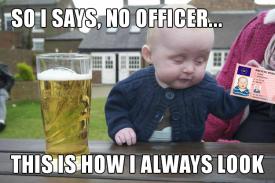Possession of Alcohol by a Minor does not only apply to kids. It applies to anyone under the age of 21. In order to be convicted of possession of alcohol by a minor the State must show that you are under 21 and that you had physical control or possession over an alcoholic beverage. "Physical control” means that you had the ability to access the alcohol immediately. You can not get out of a possession of alcohol charge by setting the can down on the ground and saying that you are not “holding” or “possessing” it. That does not work. You are capable of picking it back up off of the ground. So you have physical control over the alcohol.
Kids are going to try drugs and alcohol; that's part of society. – Jaime Lee Curtis
Why Is this a Crime?
The idea is to regulate alcohol consumption until a person is emotionally able to deal with the changes in behavior that can be brought about by consuming alcohol. It is non secret that alcohol can make you feel happy, sad, angry or depressed. It helps nervous people feel calm and calm people feel more excited. People lose their inhibitions and are more likely to engage in activities that they wouldn’t do sober. So the idea is to have a person wait to deal with all of this pressure until they are old enough to deal with this in a responsible manner. This is especially true with alcohol’s link to sexual activity.
Statistics and the Cost of Underage Drinking
Underage drinking in the United States is seen as a social problem. Studies show that we, as a society, pay almost $62 Billion dollars a year treating the problems brought about by underage drinking. This cost is spread between medical costs, for symptoms such as
Because of this underage drinking is seen as a social problem in need of regulation. The way the states have chosen to regulate it is to make it a crime.
I Am 18 and Old Enough to Vote, Why Can’t I Drink?
This is a very common question. It seems absurd that we can choose the leader of the free world while we are still in high school, but we can’t decide for ourselves if we can handle the effects of a beer.
The answer lies in War, Politics and the Constitution.
During the era of the Vietnam War, a man could be drafted to fight at the age of 18 but he could not vote for the president that would send him to war in all of the 50 states. At that time, some states had a voting age of 21 or older. So in 1971 the Twenty-Sixth Amendment was passed to ensure that the voting age could not be over 18 to protect the rights of those men who were being drafted for war.
In 1971 the drinking age in almost all states was 18.
In 1984, or 13 years later, studies by the Department of Transportation showed that there was a link between underage drinking and highway accidents (among other social ills such as suicide, alcohol dependency, death and other problems discussed above). In response, Congress told the states to raise the drinking age to 21 or lose their highway funding. So the states raised the drinking age to 21.
So while there is a Constitutional protection for us as citizens to vote at 18, there is no such protection as to our right to drink at a certain age. So the voting age is 18 and the drinking age is 21. But if some states would have their way, the age for both would be 21.
What Happens to Me if I Am Found Guilty of Drinking Underage?
Possession of Alcohol by a Minor is an interesting crime. The States find the offense terrible enough to make it a criminal act. But when it comes to sentencing an offender the penalties are often pretty light. The penalty may depend on the offender’s age.
- Fines – In most cases there is a fine that must be paid for underage drinking. In almost all states the fine is put into a trust that funds alcohol education programs. The fine can be anywhere from $50 to $500.
- Community Service – Some states impose community service hours for those caught underage drinking. This serves a few purposes such as giving the minor something productive to do so that they gain a sense of self, as well as functioning as a punishment or deterrent. In some states, upon completion of the community service hours, the State will drop the charges so the minor does not have a conviction on their record.
- Alcohol Education – Almost every judge will order a person under the age of 18 that is found guilty of drinking underage to complete a one day alcohol education class. This class addresses issues such as peer pressure, identifying reasons you may drink and the dangers of binge drinking. It also addresses unintended consequences such as teen pregnancies caused by drunken one night stands.
- Alcohol Treatment or Awareness Counseling – In severe cases, or in cases where there is a repeat offender, a judge can order that the minor must enter and complete alcohol counseling. This can be in-patient treatment although that is rare. If ordered to outpatient treatment, the minimum amount of counseling session that are required is 8 weeks.
- Detention – If the minor is actually under the age of 18 when they are caught drinking, there is a chance they can end up in the Juvenile Detention Center for the offense. In most cases a parent or guardian is notified and asked to come and pick the child up. But if they can’t contact the parent or guardian or if the minor has multiple juvenile offenses, they may end up staying in the detention center until they see the judge for a review of the circumstances.
- Suspension of License – A minor found guilty of drinking underage can face a license suspension of 6 months to one year even if they were not driving at the time that they were cited. In order to reinstate their license they must complete an alcohol awareness class that meets their particular state’s requirements. Attention under-age spring-breakers: even if you are given a ticket for a Possession of Alcohol by a Minor offense in another state your home state license will still be suspended!
- Jail – Possession of Alcohol by a Minor can be punishable by up to one year in jail in some jurisdictions, but only if the offender is between the ages of 18 and 20. Places that draw large party crowds for events such as Mardi Gras, football games or spring break usually confiscate the alcohol and keep the offenders for a few hours (or until they are sober) and release them with a fine. But it is possible to be kept longer if you are uncooperative, if you act out or try to fight or if you are a repeat offender.
- Unforeseen consequences – When a person gets arrested for possession of alcohol by a minor, they may act in a way they would not normally act. They may fight or be disrespectful to the officer. When this happens the offender could pick up additional criminal charges such as obstruction or affray and end up with more jail time.
Defenses to Possession of Alcohol by a Minor
With Someone Over the Age of 21
 If you are with a person who is of the legal age you may have a defense. This defense will only be valid ifYou were not drinking. If you are drunk, having someone of age with you will not help. The alcohol was not in your immediate possession. If it was in a car or on a towel or on the ground near you and the person who is of legal age you may have a defense. If you are holding it you do not.
If you are with a person who is of the legal age you may have a defense. This defense will only be valid ifYou were not drinking. If you are drunk, having someone of age with you will not help. The alcohol was not in your immediate possession. If it was in a car or on a towel or on the ground near you and the person who is of legal age you may have a defense. If you are holding it you do not.
If the alcohol is not open. If you are in a car or at a table and there is an unopened container of alcohol you may have a defense. If you are holding it you do not. Since the spirit of the law is to keep minors for drinking, some jurisdictions hold that if the bottle isn’t open there is non way it could be consumed. This keeps kids from being cited if they are carrying in the groceries for a parent from the car.
The person who is over 21 truthfully testifies that the alcohol belonged to them and that it was not yours and you did not consume it.
Consent of Parent or Guardian
Of the 50 states, 29 have an exception to the rule if you are in a private place (such as your home) and your parents have given you permission to drink. They are listed in the chart below. In 11 states, you may drink in public if your parent is present and says it is OK. If you are a parent or guardian, you should check to make sure what your state allows.
Constructive Possession
Constructive possession means that you are physically close to the alcohol and you have the ability to access the alcohol, but so does at least one other person. A constructive possession defense means that you are claiming that every person had the ability to access the same container of alcohol, so the State can not prove beyond a reasonable doubt that any one person did.
If all of you are under the age of 21 and all of you exhibit signs of being under the influence this defense will not work. But if one person is clearly drunk but others are not then this defense may be available.
What if I Attend a Party Where Alcohol Is Served but I Am NOT Drinking?
There are several laws on the books today that deal with house parties. The ability of you to be criminally charged depends on your particular state’s laws.
- In states such as Louisiana and Nevada, there are restrictions on charging any minor for possessing alcohol if they are on private premises regardless of whether or not the parent or guardian consented.
- California, Colorado and North Dakota have rules about whether or not a person can be cited if they are reporting a medical emergency of a fellow underage drinker.
- In states such as Florida, everyone gets a ticket and in addition there can be criminal charges brought against any adult in the home and the owner of the house.
So it all depends on where you live...
Exceptions to the Rules
There are some states that have legal exceptions to the crime of possession of alcohol by a minor. The exceptions and the states that recognize them are listed in the chart below.
| State |
Private Place with Parent Consent |
Private Place without consent |
Religious Purposes |
Govern-ment or Work Purpose |
Medical Purpose |
Education Purpose |
Public Place with Parent Consent |
Reporting of Medical Emergency due to Underage Drinking |
|
Alabama |
X |
|||||||
|
Alaska |
X |
|||||||
|
Arizona |
X |
X |
||||||
|
Arkansas |
||||||||
|
California |
X |
|||||||
|
Colorado |
X |
X |
X |
X |
X |
X |
||
|
Connecticut |
X |
X |
X |
|||||
|
Delaware |
X |
X |
||||||
|
Florida |
||||||||
|
Georgia |
X |
X |
X |
|||||
|
Hawaii |
X |
|||||||
|
Idaho |
||||||||
|
Illinois |
X |
X |
||||||
|
Indiana |
||||||||
|
Iowa |
X |
X |
||||||
|
Kansas |
X |
X |
||||||
|
Kentucky |
||||||||
|
Louisiana |
X |
X |
X |
X |
X |
|||
|
Maine |
X |
|||||||
|
Maryland |
X |
X |
||||||
|
Massachusetts |
X |
X |
||||||
|
Michigan |
X |
X |
X |
|||||
|
Minnesota |
X |
|||||||
|
Mississippi |
X |
X |
X |
|||||
|
Missouri |
||||||||
|
Montana |
X |
X |
X |
|||||
|
Nebraska |
X |
X |
X |
X |
||||
|
Nevada |
X |
X |
X |
X |
X |
|||
|
New Hampshire |
||||||||
|
New Jersey |
X |
X |
X |
X |
X |
|||
|
New Mexico |
X |
X |
||||||
|
New York |
X |
X |
X |
X |
||||
|
North Carolina |
X |
X |
X |
|||||
|
North Dakota |
X |
X |
||||||
|
Ohio |
X |
X |
X |
X |
||||
|
Oklahoma |
X |
X |
||||||
|
Oregon |
X |
X |
X |
|||||
|
Pennsylvania |
||||||||
|
Rhode Island |
X |
|||||||
|
South Carolina |
X |
X |
X |
X |
||||
|
South Dakota |
X |
|||||||
|
Tennessee |
X |
|||||||
|
Texas |
X |
X |
||||||
|
Utah |
X |
X |
||||||
|
Vermont |
X |
|||||||
|
Virginia |
X |
|||||||
|
Washington |
X |
X |
X |
|||||
|
West Virginia |
||||||||
|
Wisconsin |
X |
X |
||||||
|
Wyoming |
X |
X |
X |
X |





